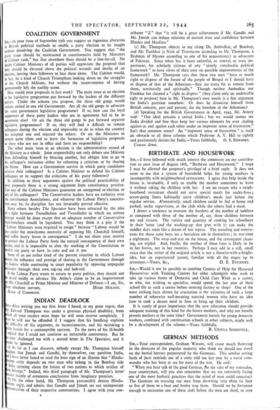INDIAN DEADLOCK
m,—After writing you my first letter I heard, to my great regret, that Ir. Edward Thompson was under a grievous physical disability, from WI all your readers must hope he will soon recover completely. I st he will not be offended if I suggest that his handicap explains e difficulty of his argument, its inconsistencies, and his mistaking a ntle banter for a contemptible sarcasm. To the news of his ill-health replied that I could not continue an intractable controversy. But he s Sow challenged me with a second letter in The Spectator, and it t be ignored.
(a). As far as I can discover, nobody except Mr. Thompson himself piles that jinnah and Gandhi, by themselves, can partition India,
I have never heard or read the leait sign of an illusion that " Hindu- Wan unity depends on two men who belong to the Bombay side India agreeing about the future of two nations to which neither of belongs." Indeed, this third paragraph of Mr. Thompson's letter' nsists mainly of erroneous conclusions from imaginary premises.
b) On the other hand, Mr. Thompson presumably desires Hindu- °skill unity, and admits that Gandhi and jinnah are not unimportant resentatives of their respective communities. I agree with your con-
tributor " Z " that " it will be. a great achievement if Mr. Gandhi and Mr. jinnah can induce relations of mutual trust and confidence between Hindus and Muslims."
(c) Mr. Thompson objects to my citing Dr. Ambedkar, of Bombay, and Mr. Panikkar (a Nain of Travencore according to Mr. Thompson, a Brahmin of Mysore according to one of his acquaintance) as advocates of Pakistan. Since when has it been unlawful, or amoral, or even im- pertinent, for scholarly citizens of any " utterly ramshackle political framework " to have views of their own on possible improvements of the framework? Mr. Thompson says that these two men " have as much right to dispose of the future of the people of Bengal as I should have to dispose of that of the Athenians—they are every bit as remote from them, territorially and spiritually." Though neither Ambedkar nor I'anikkar has claimed a " right to dispose " (they claim only an undeniable right to propose) here in Mr. Thompson's own words is a fine argument for India's partition somehow. Or does he dissociate himself from British concern, past and present, for the freedom of the Athenians?
(d) Speaking for the British Government in April, 1942, Mr. Amery said: " Our ideal remains a united India ; but we would sooner see India divided and free than keep her various elements for ever chafing against us and against each other under an impotent sense of frustration." Isn't that common sense? An " impotent sense of frustration " is itself an obstacle to all those reforms which Professor A. V. Hill so rightly and passionately desires for India.—Yours faithfully, 0. S. EDWARDS.
Craven Arms.


























 Previous page
Previous page